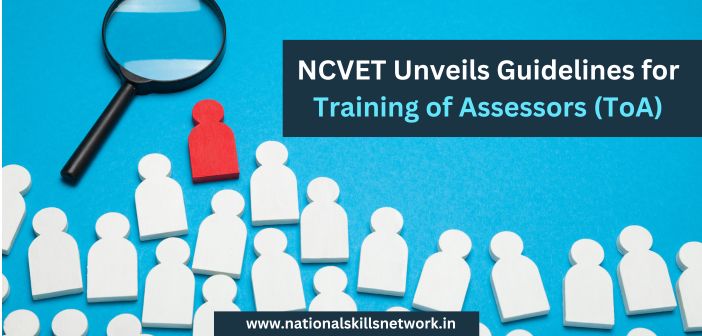In a significant move to bolster the vocational training and skill ecosystem, the National Council for Vocational Education and Training (NCVET) has recently released comprehensive guidelines for the Training of Assessors (ToA). These guidelines are designed to standardize the assessment process and address concerns regarding the competency of assessors within the skill ecosystem, marking a pivotal step towards enhancing the quality of vocational education and training in India.
Training Program for Assessors
The Training of Assessors (ToA) program outlined in these guidelines is tailored for professionals and industry experts who will play a crucial role in conducting competency-based assessments of students within the vocational skills ecosystem. These assessments are intended to ensure alignment with the National Skills Qualification Framework (NSQF) across various courses and job roles.
Eligibility Criteria and Minimum Qualifications
Central to these guidelines is the establishment of eligibility criteria and minimum qualifications required for assessors. Additionally, the guidelines define essential training requirements encompassing processes, knowledge, and testing skills necessary for the effective assessment of students or learners.

Objectives and Scope of TOA Guidelines
The guidelines for Training of Assessors aim to achieve several objectives:
- Alignment with NSQF: Ensuring assessors possess NCVET certificates aligned with NSQF, NOS, or MC relevant to the assessment.
- Candidate Selection: Identifying suitable candidates equipped to conduct assessments for NSQF-aligned courses.
- Pedagogy and Governance: Familiarizing assessors with assessment pedagogy and governance processes.
- Quality Assurance: Upholding standards of quality assessment aligned with qualifications, NOSs, and MCs.
- Cross-Sectoral Assessments: Facilitating assessments across multiple sectors as needed.
- Timely Assessments: Promoting timely assessments to streamline the evaluation process.
- Building a Competent Assessor Pool: Establishing a proficient pool of NSQF-certified assessors within the skill ecosystem.
Under the administrative view of the Ministry of Skill Development and Entrepreneurship(MSDE), the NCVET is dedicated to fostering a skilled workforce capable of meeting the demands of the evolving job market. The guidelines for Training of Assessors represent a concerted effort towards this endeavor.
Alignment with Policy Objectives
Furthermore, the issue of these guidelines reflects broader policy objectives concerning the integration of vocational education into mainstream education frameworks. With initiatives such as the National Education Policy (NEP) 2020 and National Credit Framework (NCrF) gaining momentum, the emphasis on vocational education is steadily increasing.
Framework for Future Adaptability
The formalized, quality assured, and framework outlined in these guidelines is poised to meet current job requirements while remaining adaptable to future shifts in the vocational landscape. By promoting aspirational and structured progression pathways for assessors, the guidelines aspire to cultivate efficient and industry-aligned professionals vital for the strengthening of the Vocational Education Training and Skills (VETS) ecosystem.
Qualification and Experience Level of Assessors
Moreover, the qualification and experience level of assessors will be vastly based on the NSQF levels ranging from Level 1, 2, 2.5, 3, 3.5, 4, 4.5, 5, 5.5, 6, 6.5, 7 to Level 8, corresponding to the assessments conducted.
Also read: A Guide to the NCVET Portal: Unlocking Opportunities in Vocational Education
Currently, various entities including the National Skill Trainers’ Institutes under the Directorate General of Training (DGT), awarding bodies or sector skill councils (SSCs), skill universities, and private training providers are tasked with implementing the training of assessors across India. With the rollout of these guidelines, it is anticipated that the capacity building of assessors will lead to improved outcomes within VETS ecosystem, ultimately contributing to the overarching goal of creating a highly skilled and competitive workforce in India.












